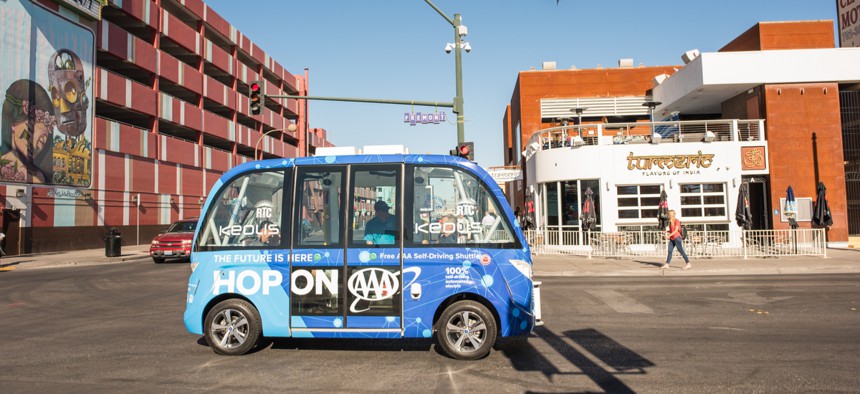This Company Helps Governments Share Project Ideas

The Atlas has 80 partner cities, including Las Vegas, which used the platform to share details about its autonomous shuttle. Shutterstock
The Atlas is an online forum that allows local governments to showcase successful public-private partnership projects in a slick, easy-to-understand way.
In November, Las Vegas debuted the country’s first autonomous shuttle to transport passengers among regular city traffic on a daily basis.
The shuttle, operated as a public-private partnership, got into a fender-bender during its first four hours on the road, colliding with a delivery truck that failed to stop, though the shuttle halted immediately as its sensors detected the other vehicle. Since then, the self-driving shuttle has operated without incident, allowing city officials to learn how autonomous vehicles interact with traffic-signaling systems and what types of safety measures need to be put in place in a public-private partnership.
Armed with that information, city officials shared the details of the project on the Atlas Marketplace, an online community designed to help local governments trade information and ideas about successful partnerships and strategies.
“We wanted to share our knowledge, and also gain knowledge from the community at large. There’s no reason for cities to reinvent the wheel,” Michael Sherwood, director of information technology for the city of Las Vegas, told Route Fifty in an interview. “We want to make sure that other cities can take advantage of our experience and learn from it so they don’t suffer from some of the challenges we’ve faced.”
The Atlas, founded by three women with backgrounds in government, runs on that very premise, according to Ellory Monks, one of its co-founders. The online forum allows local governments to showcase successful public-private partnership projects in a slick, easy-to-understand way.
The site currently has 80 partner cities, including several outside of the United States. Participation is free for government officials, who can log on and seek inspiration, browse projects and then contact the people who helped shepherd them from ideas to reality.
“It’s an online community for local government officials and staff to do three things,” Monks told Route Fifty in an interview. “To share their own success stories, learn about what’s working in other communities, and connect with folks who can help them jump-start progress on projects.”
The on-boarding process looks something like this: a government official logs onto the site and creates a profile, which grants immediate access to the marketplace platform. After that, Atlas staff will set up an hour-long phone call to learn about the city’s priorities and what officials would like help with.
“Then we zero in together on near-term opportunities for us to help them,” Monks said. “It could be something specific, like, ‘Hey, I need help figuring out how other cities have procured smart-grid AMI networks in the past three years.’ Or it could be something big and broad, like, ‘We need help telling our success stories in a way that other people really identify with and get excited about.’”
Private companies that participate in partnership projects with local governments also have access to the site, but must pay to use it. In exchange, Monks said, companies receive increased exposure for their work, along with help from her team in fine-tuning explanations of the projects.
“Often times their case studies are hard to actually understand or get excited by,” Monks said. “We work with the partners to turn those case studies into rich, interactive project features that city officials can understand and get really excited about, because it’s obvious to them what problem they solved, how it was funded and financed, how it was procured—all of that.”
Because so many of the projects are innovative or tech-based, participating companies are often the only ones who can provide detailed insight on the work—meaning geography doesn’t stand in the way of local governments who may want more information but are located miles or even states apart from the partner corporation.
“They’re not necessarily the run-of-the-mill projects that you think of when you think of local government projects, so as a result, there are not necessarily local firms that do this work,” Monks said. “That’s why this area is really ripe for this kind of community—because the cities and local governments pursuing these projects often need access to new partners to do this work.”
That access helps the cities as well. For example, since sharing information about its autonomous shuttle, Las Vegas has fielded questions from dozens of cities about its automated shuttle project, including several international communities.
“Over 50 American cities have come to visit and look at our smart-city initiatives, with the focal point being the shuttle,” Sherwood said. “We’ve had several overseas visits from Australia, Europe, even Latin America. The ability to learn and communicate and share grows increasingly important as we partner together to share ideas. You can’t deny the value of having a network at your disposal.”
Kate Elizabeth Queram is a Staff Correspondent for Government Executive’s Route Fifty and is based in Washington, D.C.
NEXT STORY: VA explores blockchain for contract close-outs





